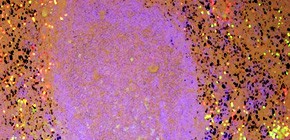
Mechanism for reinforcing immune responses to malaria clarified
Under the leadership of Cevayir Coban , Associate Professor, Immunology Frontier Research Center, Osaka University, a group of researchers has discovered that, during malaria infection, Lipocalin 2 bolsters immune responses to malaria infection by reinforcing host metabolism.
Abstract
"Plasmodium parasites multiply within host erythrocytes, which contain high levels of iron, and parasite egress from these cells results in iron release and host anemia. Although Plasmodium requires host iron for replication, how host iron homeostasis and responses to these fluxes affect Plasmodium infection are incompletely understood. We determined that Lipocalin 2 (Lcn2), a host protein that sequesters iron, is abundantly secreted during human (P. vivax) and mouse (P. yoeliiNL) blood-stage malaria infections and is essential to control P. yoeliiNL parasitemia, anemia, and host survival. During infection, Lcn2 bolsters both host macrophage function and granulocyte recruitment and limits reticulocytosis, or the expansion of immature erythrocytes, which are the preferred target cell of P. yoeliiNL. Additionally, a chronic iron imbalance due to Lcn2 deficiency results in impaired adaptive immune responses against Plasmodium parasites. Thus, Lcn2 exerts antiparasitic effects by maintaining iron homeostasis and promoting innate and adaptive immune responses. "

Figure 1

Figure 2
To learn more about this research, please read the full research report entitled " Lipocalin 2 Bolsters Innate and Adaptive Immune Responses to Blood-Stage Malaria Infection by Reinforcing Host Iron Metabolism " at this page of the Cell Host & Microbe website.
Related link
